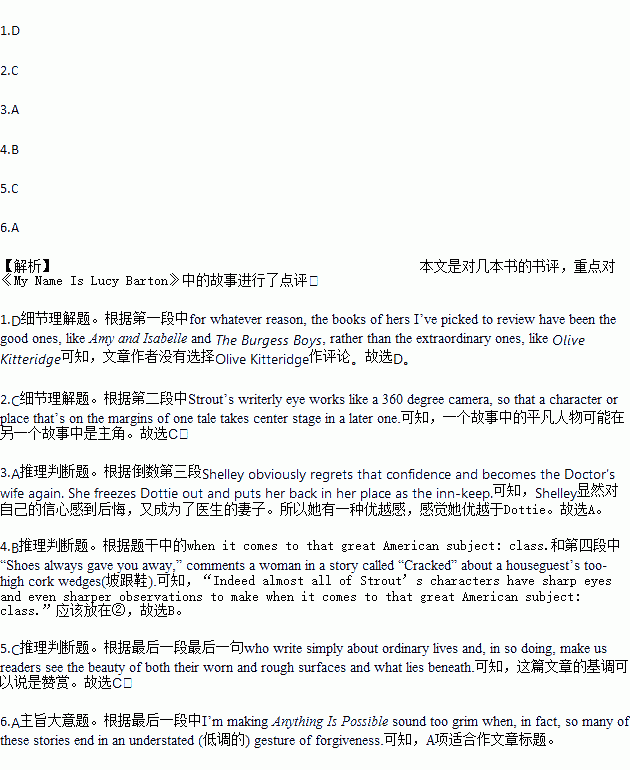题目内容
My timing has always been a little off with Elizabeth Strout. I’ve read and pretty much admired everything she’s written, but, for whatever reason, the books of hers I’ve picked to review have been the good ones, like Amy and Isabelle and The Burgess Boys, rather than the extraordinary ones, like Olive Kitteridge, which won the 2009 Pulitzer Prize. Anything Is Possible is Strout’s latest book and it’s gorgeous. Like Olive Kitteridge, Anything Is Possible reads like a novel constructed out of linked stories. In fact, it’s hard to know exactly what to call this — a novel or a short story collection. In any case, these stories are animated (栩栩如生) by Strout’s signature themes: class humiliation, loneliness, spiritual and, sometimes, reawakening. When Strout is really on her game, as she is here, you feel like you’ve been carefully lowered into the unquiet depths of quiet lives.
Strout began working on Anything Is Possible at the same time she was writing her novel My Name Is Lucy Barton, which was published last year. Lucy, a dirt-poor child who grows up to become a celebrated writer, floats in and out of these interlocking stories. Some characters catch a glimpse of her being interviewed on TV; one travels to see her at a bookstore. An older Lucy even appears “in the flesh” in one story when she returns home to the small town in rural Illinois where most of these tales are set to visit her troubled brother; but Anything Is Possible also stands on its own. Indeed, a few of the characters here would be ticked off if they thought their stories depended in any way on that Barton girl. Strout’s writerly eye works like a 360 degree camera, so that a character or place that’s on the margins of one tale takes center stage in a later one. This technique sounds contrived, but Strout carries it off lightly.
①__ One of the most powerful stories here is called “Dottie’s Bed & Breakfast,” which is an establishment we readers glimpse earlier in the book. Dottie desires to be middle-class and she harbors a grudge (怨恨) against life because she’s had to rent out rooms to make a living. Dottie also possesses a sensitive nose for sniffing out the lower-class origins of some of her guests.
②__ “Shoes always gave you away,” comments a woman in a story called “Cracked” about a houseguest’s too-high cork wedges(坡跟鞋). And, in the final story here, called “Gift,” a once-poor man made good says, “The sense of apology did not go away, it was a tiring thing to carry.”
③__ But, back to Dottie. When an elderly doctor and his wife come to stay at her guesthouse, Dottie bonds over tea with the wife, Shelley, who shares a story about a long-ago social humiliation.
④__ At breakfast the next morning, however, Shelley obviously regrets that confidence and becomes the Doctor’s wife again. She freezes Dottie out and puts her back in her place as the inn-keep.
There’s comic satisfaction in seeing Dottie secretly spitting into the breakfast jam, but the more profound rewards of this story have to do with its recognition of the many varieties of human insecurity — or, as Lucy Barton herself more bluntly puts it, the many ways “people are always looking to feel superior to someone else.”
Other stories have to do with sexual shame, or with the tragic ways close neighbors or family members misread each other; but I’m making Anything Is Possible sound too grim when, in fact, so many of these stories end in an understated (低调的) gesture of forgiveness. Strout is in that special company of writers like Richard Ford, Stewart O’Nan and Richard Russo, who write simply about ordinary lives and, in so doing, make us readers see the beauty of both their worn and rough surfaces and what lies beneath.
1.The author of the article may have reviewed these books EXCEPT_______.
A. Amy and Isabelle B. The Burgess Boys
C. Anything Is Possible D. Olive Kitteridge
2.What can be inferred according to the second paragraph?
A. The book Anything Is Possible depends wholly on that Barton girl.
B. The character Lucy floats in and out of these disconnected stories.
C. An ordinary character in one story can be a leading role in another.
D. Elizabeth Strout isn’t skillful at describing small characters in life.
3.Shelley freezes Dottie out the next morning because _______.
A. she feels she is superior to Dottie
B. Dottie spits into the breakfast jam
C. Dottie desires to be middle-class
D. she regrets the confidence in Dottie
4.The sentence “Indeed almost all of Strout’s characters have sharp eyes and even sharper observations to make when it comes to that great American subject: class.” should be put in ______.
A. ① B. ②
C. ③ D. ④
5.The tone of the article can be described as _______.
A. depressing B. critical
C. appreciative D. indifferent
6.What might be the best title for the passage?
A. Anything Is Possible — unquietness depths of ordinary lives
B. Elizabeth Strout — an outstanding Pulitzer Prize Winner
C. Anything Is Possible — a collection of grim short stories
D. Elizabeth Strout — a writer with clever writing techniques
 名校课堂系列答案
名校课堂系列答案
